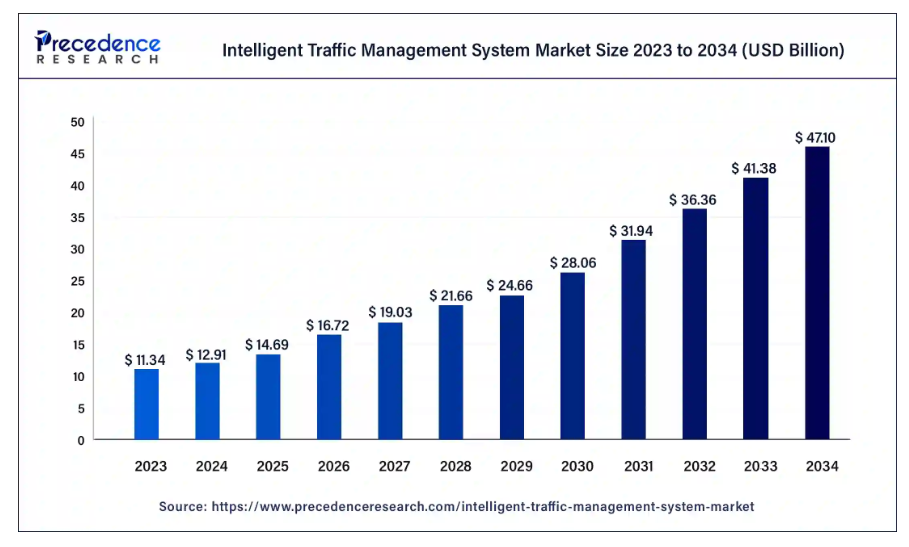Smart Traffic Management: The Future of Safer, Smoother Roads in Saudi Cities
Traffic congestion remains one of the biggest challenges facing urban areas worldwide. In Saudi Arabia’s bustling cities, daily commutes are often slowed by traffic jams, causing delays and increased emissions. According to recent estimates, AI-powered traffic systems can reduce congestion by up to 20%, translating to shorter, smoother journeys for residents. To tackle these issues, Saudi Arabia is turning to smart traffic management systems powered by AI and IoT. These technologies are designed to optimize traffic flow, reduce congestion, and improve road safety, paving the way for cities that are not only smarter but more sustainable—aligning with the Kingdom’s Vision 2030 goals.
The Role of AI and IoT in Smart Traffic Management
Smart traffic management systems rely heavily on artificial intelligence and the Internet of Things to monitor, analyze, and control traffic patterns. With AI-powered algorithms, these systems can predict traffic congestion, adjust signal timings, and divert traffic when needed. IoT sensors embedded in traffic signals, roadways, and vehicles collect real-time data, enabling the system to respond dynamically to changing traffic conditions. Research shows that such AI-driven systems can reduce travel time by up to 25% and traffic congestion by 20%, which translates to smoother and shorter journeys for commuters.
In cities like Riyadh and Jeddah, these smart systems are being rolled out with impressive results. Real-time data collected from sensors helps the system detect high-traffic areas and apply immediate solutions, such as adjusting traffic light sequences or directing drivers to less congested routes. By acting on live traffic data, these systems are reducing bottlenecks and making traffic flow more efficient across the city.
Saudi Arabia’s Commitment to Smart Infrastructure
Saudi Arabia is seeing promising results with smart traffic management, especially during the annual Hajj season in Makkah. In 2023, with over 1.8 million pilgrims, AI-driven technologies were deployed to enhance traffic control and streamline movement across the city. These solutions, including real-time monitoring, adaptive signal controls, and AI-based algorithms for vehicle tracking, helped reduce congestion and improve flow.
Security spokesperson Col. Talal bin Abdulmohsen Al-Shalhoub noted that new AI applications developed with the Civil Defense and Saudi Data and AI Authority provided critical support. Innovations such as drones for road inspections, augmented reality glasses for field supervision, and electric scooters on designated paths are transforming congestion management and optimizing the pilgrimage experience.
This is just the beginning, as the Kingdom aims to achieve even greater efficiency as part of its Vision 2030 initiative, which includes transforming urban infrastructure and creating smart cities. By investing in AI and IoT-driven traffic management, Saudi Arabia is not only keeping pace with global urban development trends but is also actively enhancing the quality of life for its citizens.
Global Market Context and Saudi Arabia’s Sustainable Future

The global market for smart traffic management is growing rapidly and is expected to reach $14.7 billion by 2026, signaling that cities worldwide are moving toward more intelligent solutions. As Saudi cities adopt these systems, they are positioning themselves to be at the forefront of a global shift toward smart urban infrastructure. By reducing congestion and cutting emissions, Saudi Arabia is making strides toward a sustainable future.
Benefits of Smart Traffic Management for Daily Life
One of the most immediate benefits of smart traffic management for Saudi citizens is the improvement in daily commutes. As travel times decrease, people spend less time stuck in traffic and more time on what matters to them. In addition, by easing congestion, these systems also help lower fuel consumption and carbon emissions, which is essential for environmental sustainability.
Smart traffic systems are also enhancing road safety. With the ability to monitor road conditions and adjust traffic controls accordingly, these systems can reduce accident risks and ensure smoother traffic flow during peak hours. For instance, the system can automatically lower speed limits during adverse weather conditions or direct traffic away from accident-prone areas.
The Future of Traffic Management in Saudi Cities
Saudi Arabia’s investment in smart traffic management is a key component of its Vision 2030 plan, aiming to create cities that are as sustainable as they are livable. As these smart technologies become more prevalent, Saudi citizens can look forward to reduced commute times, safer roads, and a more efficient urban experience. By leveraging AI and IoT, Saudi Arabia is reshaping its cities to meet the needs of the future—making smart traffic management an essential part of its journey toward modernization.
In conclusion, smart traffic management is more than just a technological trend; it’s a step toward a better quality of life for Saudi residents. With the help of AI and IoT, Saudi cities are becoming smarter, more efficient, and better equipped to handle the challenges of urban mobility.



